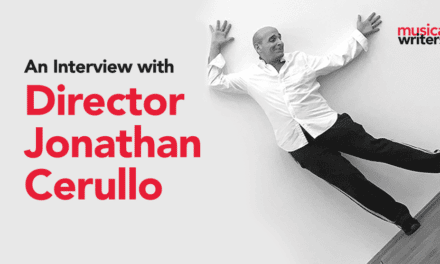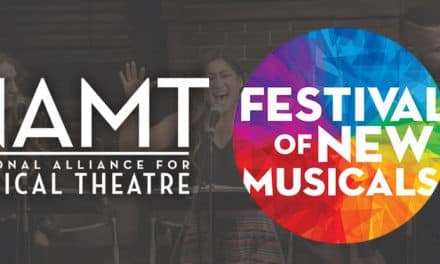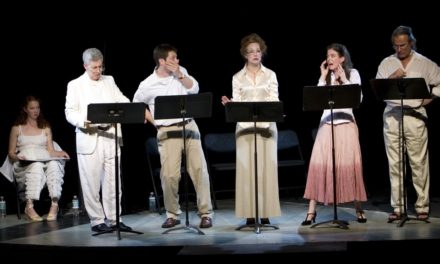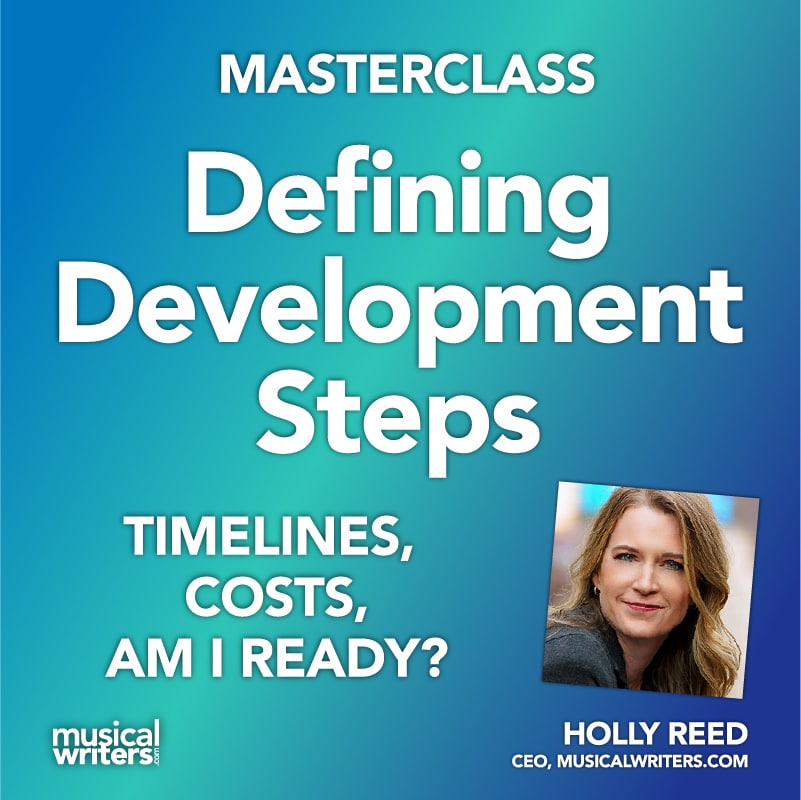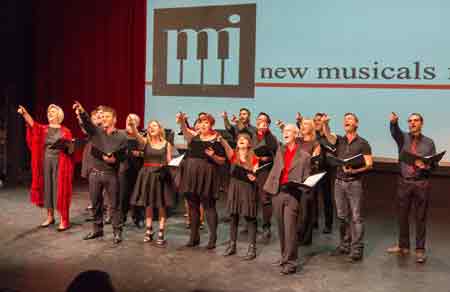
Academy Repertory Company in the annual GOT MUSICAL concert that presents short excerpts from shows in development at New Musicals Inc.
by Carol de Giere
Perfecting a musical can be a multi-year, sometimes wearying project. That’s why experienced musical writers often keep themselves encouraged through short presentations. They either submit their work to an established program that showcases excerpts or they organize their own opportunity. Being part of a short-format program may also help further a show on its journey to full production.
Why Spend Time on Short Presentations?
Preparing a short presentation takes extra time, but the exposure can help you build an audience for your work, both through the event and the publicity. Having a piece heard by an audience can also be affirming for the writing team, even if it’s only a song or two.
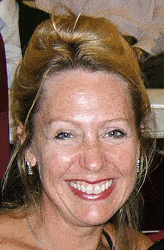
Bookwriter and lyricist Beth Blatt
Book writer and lyricist Beth Blatt was invited to provide a few pieces for a special evening of works by women writer teams. She recalls, “They did two songs out of context from my song cycle, The Mistress Cycle. What was great about that is that I haven’t looked at that show or listened to it in a while and it was very affirming to hear how well it worked out of context.” She recommends finding opportunities for experiences like this. “Not everything works out of context, but I think it works as a fire for you. A lot of writing is solitary. If you don’t write both music and lyrics, it takes more time for the songs to become real. To hear your work in the world is so affirming. You want people singing your work, and sometimes there are producers who hear it.”
Collaboration Testing and Practice
Short presentations can also help to prove that a new collaborative team is working. Composer Ryan Luevano highly recommends performing a short piece in public. “If you’re a composer who doesn’t write lyrics and you want to work with a lyricist, it’s important to see how you write together and if you can work together. I think a song, then maybe a song cycle would be great if you’ve never worked with someone before.”
Book writer and lyricist Joan Ross Sorkin had only been working with composer Randy Klein for about a month before having a chance to present a scene and a song from their brand new musical, Odette/Odile, at Music Theatre of Connecticut in Norwalk, CT (MTC). Called “Page to Stage,” the event also featured three other presentations, and was arranged with the professional musical writing group that meets at MTC.
Sorkin comments, “We found that presenting this short excerpt was actually so helpful in our developmental process because it gave Randy and me the opportunity to really focus on our lead character and what her journey would be in the scene and the song. During our working process we drilled down to hone her spoken and musical voice and the work we did really paid off in the showcase. We watched the audience during the presentation and they were rapt. So we knew the song and scene were working. And better still, we knew our new collaboration was working. That alone made the evening worthwhile. Accordingly, I would tell other writers not to shy away from presenting a short excerpt publicly as part of their development process, so long as the team believes that piece of their show is ready to be heard.”
Building a Reputation through Short Musical Presentations
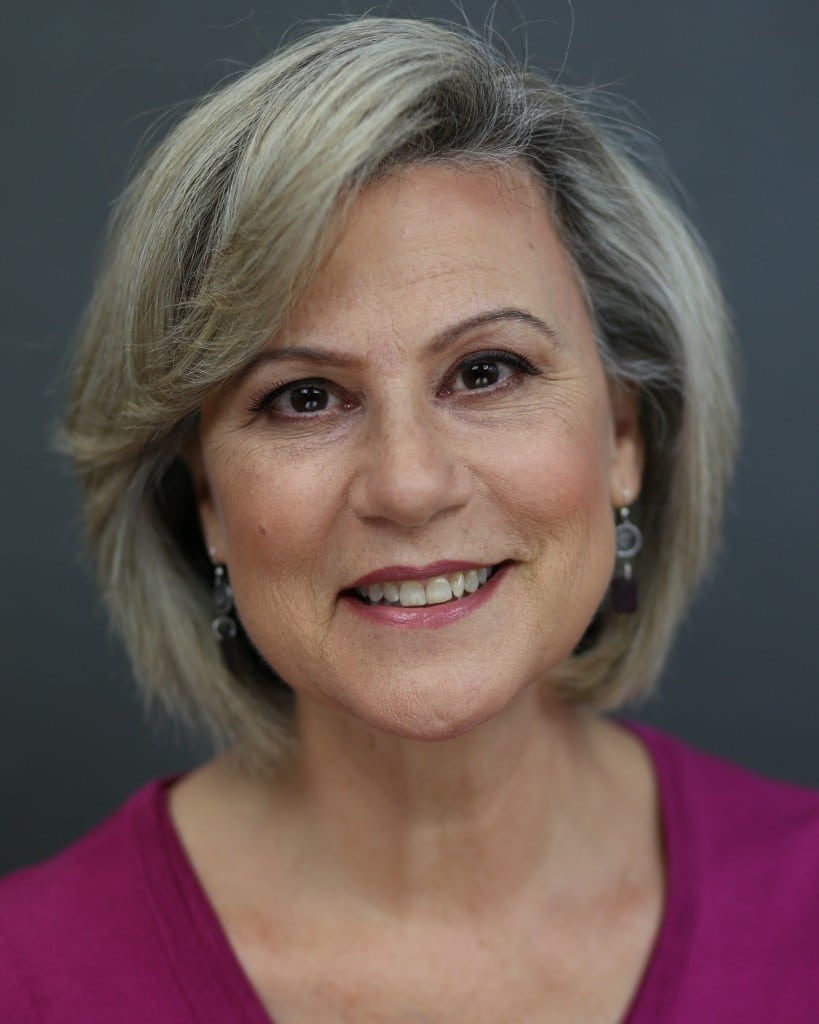
Elise Dewsberry, Artistic Director of New Musicals Inc.
Elise Dewsberry is one of the many writers and advisors who appreciates the value of short presentations. In her role as Artistic Director of New Musicals Inc. and the Academy for New Musical Theatre, as well as a dramaturg, producer, and director, she sees a short piece as an opportunity. “Everybody is so busy, it’s difficult for people to commit time, even people who want to be involved in the development of new works,” she comments. That’s one reason why organizations like hers, ASCAP and BMI, the National Alliance for Musical Theater (NAMT), or Theatre Resources Unlimited (TRU) set up programs that involve excerpts of longer shows. “If the presentation is shorter, people who stage musicals are more likely to have a look at it and they want to know what else you’ve done,” Dewsberry adds. “They may want to talk to you about other projects.
Building an audience for your work can take time, and it may be only a musical writer’s dream that a producer will happen into a presentation, hear their work, and want to produce their show. Still, it doesn’t hurt, says Dewsberry about her experience in the Los Angeles area. “Exposure is never bad, because you can get a buzz going, people talking about the show. We have several different cabarets out here in LA that do a song or two. I think it’s great for exposure and to keep people’s chops up.”
She mentions A Little New Music, a cabaret series at the Catalina Jazz Club in Hollywood that presents new musical pieces every few months. There’s also the Foundation for New American Musical’s Musi-Cal that makes an ongoing effort to create community among Southern California’s composers, lyricists and book writers. Their Musi-Cal evenings offer an opportunity for the writers to get to know one another and for the audience to get a first peek at new musical works in progress.
Dewsberry also confirms the value of short presentations for practice and testing. For some of the ongoing classes held at NMI, the writing teams perform 15-minute musicals at the culmination. “It’s a class exercise, but we also find it’s a great way to test out a collaboration. We’ve recently been encouraging writers a lot to write even shorter than 15 minutes, such as to write something they could post on YouTube in order to see that that partnership is worth pursuing, because it’s so hard to find the right collaborator. And if you commit to a full length project together, that’s a big commitment if you’re not yet sure that the collaboration is going to work. We find the shorter projects are useful.”
Drawbacks to Creating and Presenting Excerpts
As beneficial as this practice may be, there are sometimes drawbacks. For one thing, it takes extra time to create a short piece from a long one. When Beth Blatt presented the latest version of her musical Oneida at the Music Theatre of Connecticut “Page to Stage” program, she found it challenging to make an out-of-context piece understandable to an audience for a twenty-minute presentation. She says, “It took quite a bit of thinking. Normally I have a lot more time to explain the world, to set up the characters, to include secondary characters who become important later and you’ve got to give their material to other people. So it was quite time consuming to come up with an 18-page draft. That was a bit of a negative.” At the same time, she discovered that the process of condensing had a side benefit. “I trimmed some of the scenes in ways that I’m going to retain. It made me write shorter in a couple of the scenes; I had to focus it for time constraints and some of those cuts were good ones that I’ll keep.”
She notes that from a short presentation it’s possible to get bogged down in too much feedback that is not really helpful for the writers. But as long as you pick and choose how to respond, you can keep the experience positive.
Finding Opportunities for Short Musical Presentations
As mentioned, some organizations set up opportunities for showcasing songs or excerpts from musical writers, but you can also seek them out your own. Nonprofit organizations regularly hold fundraising events or celebrations and you may be able to volunteer a song suited to their event. You might even consider writing a new song along a particular theme they need. Composer Ryan Luevano was involved in a group’s effort to restore the aging, historic Rialto Theatre of South Pasadena. He says, “I wrote a song for the Rialto’s birthday party, which means I got my song played in front of a hundred people. So gaining credits and networking is something a writer can do.”
Many cities have bars with cabaret spaces or piano bar performances. Writers can reach out to singers who might include a piece in their set, or provide an evening of entertainment. (You might want to start out by attending performances of others, and network.)
Here are a few other suggestions:
- In Los Angeles, A Little New Music is (according to their website) “the best hour of new and unheard musical theatre material in LA.” Alittlenewmusic.org.
- In New York City, the Programming Director of Feinstein’s 54 Below, Jennifer Ashley Tepper, is a good person to know. She schedules appearances and a series that showcases new musicals.
- Sound Bites – 10-Minute Musicals Festival. This annual festival in New York City showcases excerpts or original 10-minute pieces. Submissions open now with September 1st deadline for the January 2017 festival. Multiple musicals can be submitted..
- MTF: The Musical Theatre Factory includes “4 x 15” – evenings of fifteen-minute excerpts from four musicals (Their programs will start up again in the fall).
- NAMT (45 minutes) – This is one of the most prestigious and most difficult to have your work selected as one of eight musicals to be presented in 45-minute excerpts. Submissions open in November for a January deadline.
- NMI is currently enrolling for the Core Curriculum which begins in Sept and culminates in 15-minute musicals next June. Core Curriculum (NMI can livestream classes from locations outside of Los Angeles).
- TRU includes short presentations as part of the workshops for writers.
- The Rhinebeck Writers Retreat offers “Meet the Writers” concert events for writing teams who have been accepted into their summer program.


